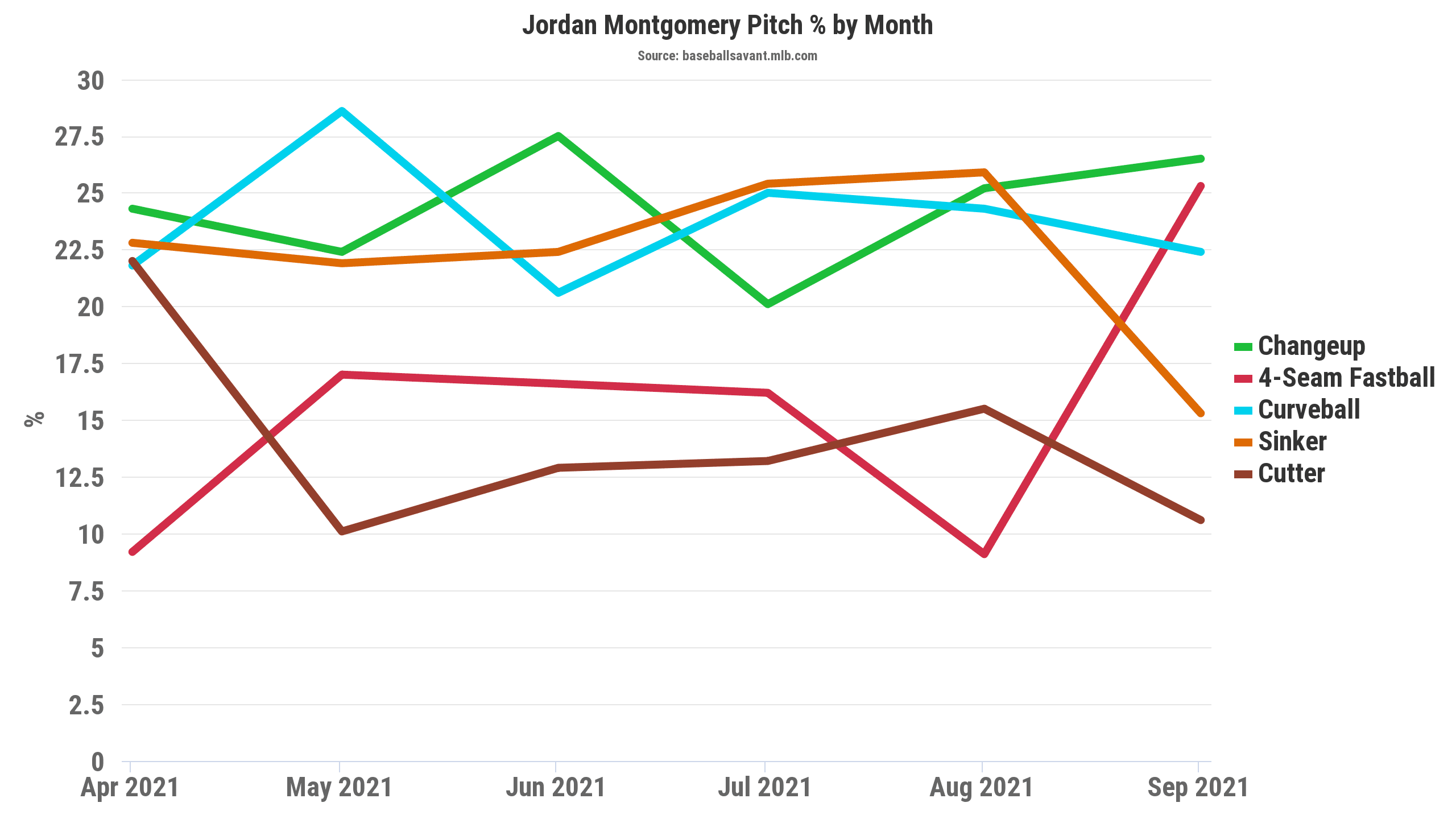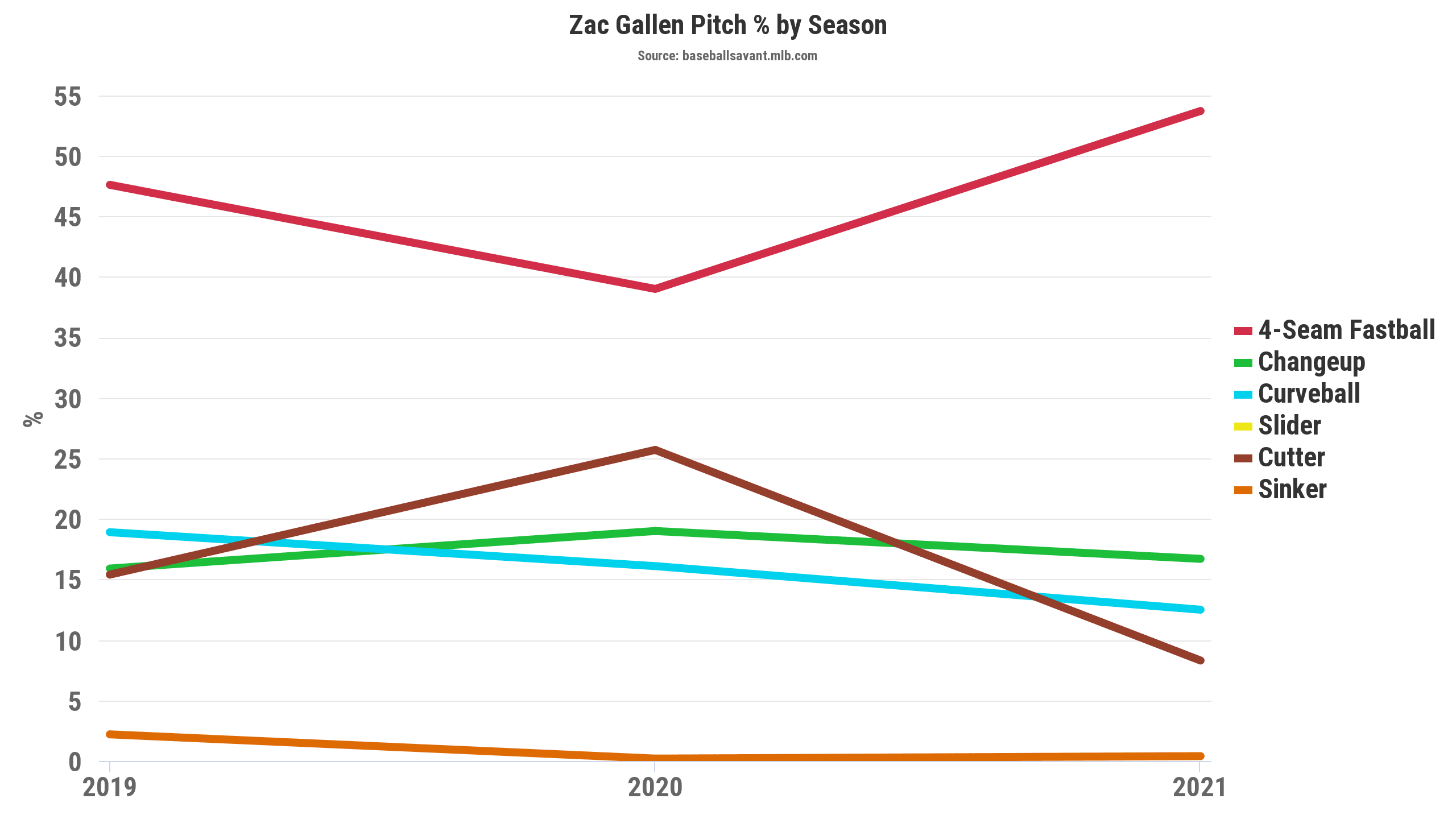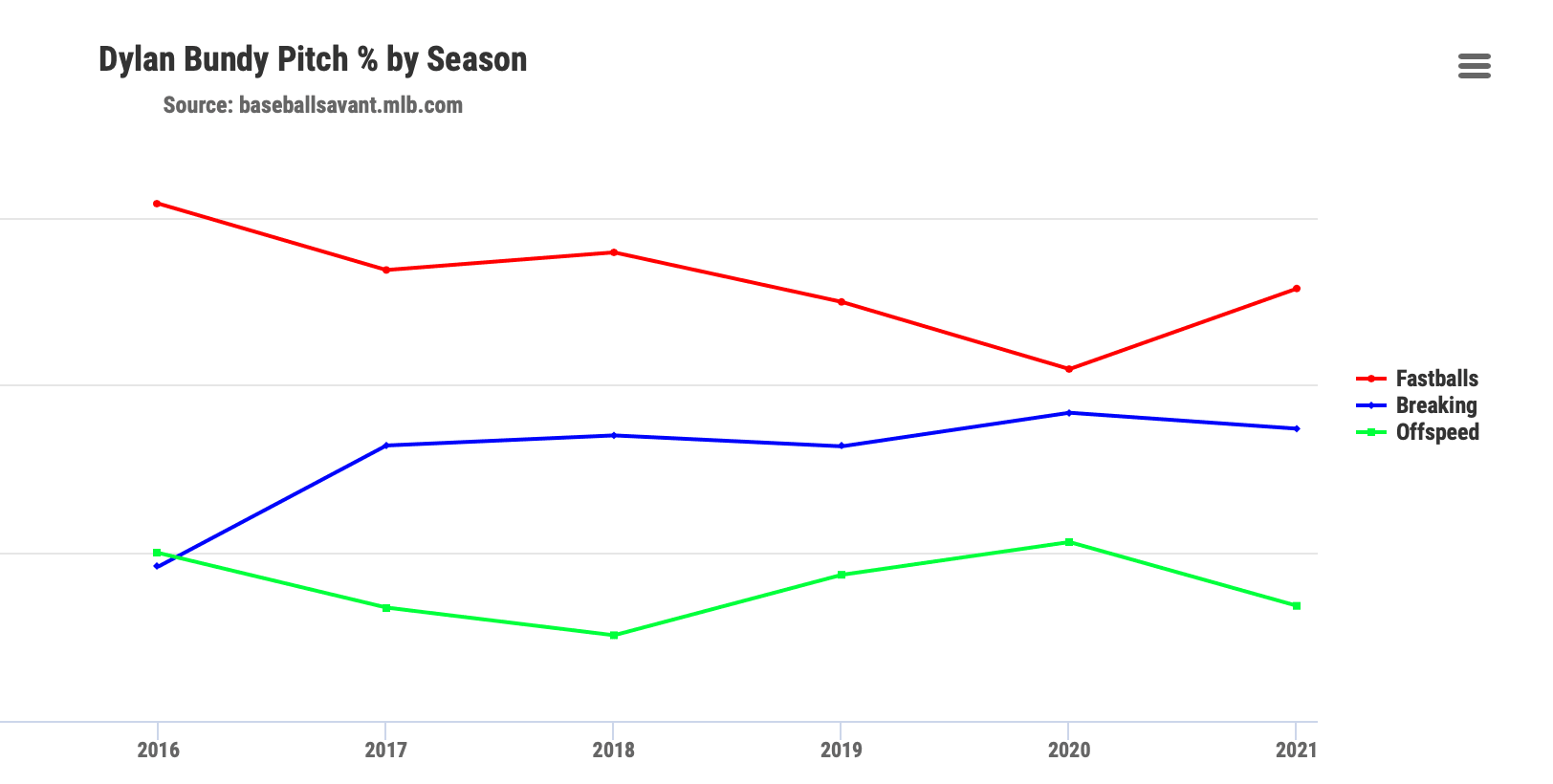Justin Dunbar identifies potential breakout pitchers for 2022 fantasy baseball based on reduced fastball usage. These SP are relying less on four-seam fastballs with better results and higher K%.
Every year, we are looking at different ways to find fantasy baseball breakouts. This is particularly true on the pitching side of things.
Pitchers tend to be more volatile in terms of their year-to-year performance than hitters, paving the way for under-the-radar talents to emerge as frontline starters. When that happens, you'll want them on your fantasy team.
One great way to identify a breakout pitcher on the horizon is by examining changes in their pitch mix. Specifically, how much does a pitcher throw their fastball?
Be sure to check all of our fantasy baseball lineup tools and resources:- Fantasy baseball trade analyzer
- BvP matchups data (Batter vs. Pitcher)
- PvB matchups data (Pitcher vs. Batter)
- Who should I start? Fantasy baseball comparisons
- Daily MLB starting lineups
- Fantasy baseball closer depth charts
- Fantasy Baseball live scoreboard
- Fantasy baseball injury reports
Rationale
Since 2015, fastballs and sinkers have been the hardest-hit pitches.
WEIGHTED ON-BASE AVERAGE (wOBA) ALLOWED BY PITCH TYPE
- Fastball: .350
- Sinker: .349
- Cutter: .315
- Changeup: .292
- Slider: .269
- Curveball: .263
- Splitter: .257
As you can see, there are clear advantages when it comes to throwing your fastball less. Obviously, you still need to have it as a threat, or else your other pitches may become overexposed, but there is no need to be overreliant on your fastball, unless it is a strong offering.
Today, we will be looking at pitchers who altered their overall fastball usage the most in 2021, compared to 2020. Who was lying on their fastball more, and who got the memo that they don't need to be as reliant on an inferior pitch? Answering these questions can help us identify breakouts for the 2021 season!
Pitchers Who Threw Fewer Fastballs In 2021

Sandy Alcantara, Miami Marlins
As someone who averaged 98 MPH with his fastball last season, you'd expect a higher strikeout rate than 24% for Sandy Alcantara. The 26-year-old posted a 3.19 ERA and was an absolute workhorse with 205.2 innings pitched, but for him to be an all-around fantasy ace, he needs to strike batters out more consistently.
Fortunately, it all seems to be coming together for Alcantara. In his final 12 starts, he performed about as well as you could have expected:
- 28.4% K, 3.8% BB, 24.7% K-BB, 3.04 ERA, 3.01 SIERA, 15.1% swinging strike rate
Those are marquee ace-level numbers. Meanwhile, this was not a mere coincidence. See, Alcantara's slider is an elite weapon; it induced a whiff rate of 38.3% and a wOBA of .242. In this hot stretch, Alcantara started to embrace it:

If Alcantara continues to utilize his slider as he did at the end of the season, his strikeout potential is through the roof. Steamer projects a 24% strikeout rate for Alcantara, but that's assuming he doesn't continue his evolution as a true fantasy ace.
Over the past month, he's being drafted as the 11th starting pitcher off the board. Thus, fantasy baseball managers are clearly confident in that evolution continuing to take place. In my opinion, this is rightfully founded. Looking through a player's pitch mix is a great way to understand the constant journey they face in terms of becoming the best versions of themselves. Alcantara may have just reached that peak, and you won't want to miss out.
Jordan Montgomery, New York Yankees
With a 24.5% strikeout rate that essentially matched the 24.4% strikeout rate he posted last season, it wouldn't seem like Jordan Montgomery changed much between 2020 and 2021.
Yet, that would not be the case. The 29-year-old bumped his swinging strike rate to 13.7%, yet fewer called strikes may have played a role in him getting fewer strikeouts. That being said, called strikes aren't very stable from season to season, so a lot is working in Montgomery's favor when it comes to striking more batters out in 2022.
Over Montgomery's final six starts last season, he posted a 29% strikeout rate in addition to a 15.1% swinging-strike rate. It was a very strong way to end the year, and now, we have to hope it continues into 2022. Really, it all comes down to his pitch mix. As you can see, he threw less fastballs in 2022, which was already a strong start to becoming the best version of himself. However, there is more to this. Let's take a look at Montgomery's stats per pitch type:
JORDAN MONTGOMERY STATS PER PITCH TYPE
- Changeup: .233 wOBA allowed, 39.2% whiff
- Curveball: .217 wOBA allowed, 42.9% whiff
- Sinker: .412 wOBA allowed, 11.7% whiff
- Fastball: .327 wOBA allowed, 19% whiff
- Cutter: .377 wOBA allowed, 20.3% whiff
It's clear that Montgomery's changeup and curveball are his two best pitches; since he is naturally going to face a lot of right-handed hitters, the changeup should be a focus for him. However, be aware of the split between his four-seam fastball and sinker. Montgomery came into the league as a sinker-baller, but that prohibited his ability to miss bats. In the last month of the season, he finally seemed to put it all together.

With more four-seam fastballs, fewer sinkers, and more changeups, Montgomery may have finally realized his true potential. I think he's a strong candidate to take a step forward this season and would be targeting him in drafts; he is currently being drafted as the 84th pitcher in NFBC drafts. This is what we call evolution and I'm completely buying it for Montgomery in 2022.
Pitchers Who Threw More Fastballs in 2021

Zac Gallen, Arizona Diamondbacks
The main change for Gallen was that he threw his four-seam fastball significantly more in 2021, ditching his cutter for the most part.

Considering that Gallen's fastball is more effective than his cutter, this is a promising development. That being said, there is reason to be concerned about his 9.1% swinging-strike rate, which is much lower than the 12.1% rate he had posted in the two seasons prior.
What changed for Gallen in 2021? For me, it's his pitch location. In 2021, he lowered his average pitch height to 2.38 feet, which is quite low. Thus, instead of being a north/south pitcher, he was just a "south" pitcher. With above-average vertical movement on all of his main pitches, this shouldn't be the case.
Luckily for Gallen, he'll be teamed up with a new pitching coach in Brett Strom. During his time as the pitching coach in Houston, Strom was one of the first innovators when it came to establishing a vertical, north/south profile when it comes to pitch location, making this quite the ideal pairing between pitcher and coach.
If Gallen starts tapping into his vertical arsenal properly, the ceiling is through the roof in terms of what he's capable of. He's currently being drafted as the 51st pitcher, which appears to be an overreaction to the 4.30 ERA he posted last year. When projecting him moving forward, he has to take his past success into account, and I expect him to set a career-high when it comes to strikeouts in 2022. The ramifications of Strom being hired in Arizona cannot be understated; Gallen could be posted for a career year in 2022, and you won't want to miss out.
Dylan Bundy, Minnesota Twins
Usually, when you have a breakout season, you continue to do what was working for you. For Dylan Bundy, though, that was not the case.
In 2020, Bundy had a career season, posting a 3.29 ERA, 20.6% K-BB, 27% strikeout rate, and 2.95 FIP. How did this happen? Well, to understand the mystery of Bundy, let us start with his pitch mix:
DYLAN BUNDY wOBA ALLOWED BY PITCH
- Fastball: .373 wOBA Allowed
- Slider: .234 wOBA Allowed
- Curveball: .252 wOBA Allowed
- Changeup: .338 wOBA Allowed
- Sinker: .402 wOBA Allowed
As you can see, Bundy's fastballs have struggled mightily, but his breaking balls have thrived. That's the realization he appeared to have in 2020 upon being traded to the Angels:

After throwing his fastballs under 42% in 2020, Bundy spiked that up to 51.5% in 2021. Perhaps consequently, his strikeout rate dropped to 21.2%, while his SIERA (4.56) spiked to his previous norms. In other words, he went back to being the pitcher he was prior to 2020, as opposed to the front-line starter potential he flashed in the shortened season.
After signing with a new organization in the Twins, the hope is that Bundy can get back to the pitch mix he demonstrated in 2020. This is his best chance of missing bats and limiting hard contact, and it is a change I believe he can make with a notably progressive organization. If so, he could end up being one of the massive steals of 2022 fantasy baseball drafts. With an average draft position of 450 currently, what do you have to lose?
Download Our Free News & Alerts Mobile App
Like what you see? Download our updated fantasy baseball app for iPhone and Android with 24x7 player news, injury alerts, sleepers, prospects & more. All free!

More Fantasy Baseball Advice
 RADIO
RADIO
























